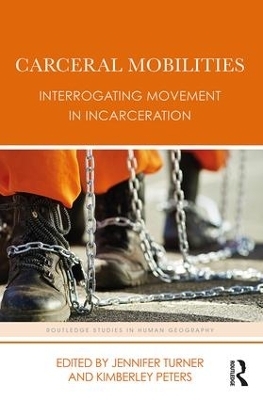
Carceral Mobilities
Routledge (Verlag)
978-1-138-18404-6 (ISBN)
At first glance, the words ‘carceral’ and ‘mobilities’ seem to sit uneasily together. This book challenges the assumption that carceral life is characterised by a lack of movement. Carceral Mobilities brings together contributions that speak to contemporary debates across carceral studies and mobilities research, offering fresh insights to both areas by identifying and unpicking the manifold mobilities that shape, and are shaped by, carceral regimes. It features four sections that move the reader through the varying typologies of motion underscoring carceral life: tension; circulation; distribution; and transition. Each mobilities-led section seeks to explore the politics encapsulated in specific regimes of carceral movement.
With contributions from leading scholars, and a range of international examples, this book provides an authoritative voice on carceral mobilities from a variety of perspectives, including criminology, sociology, history, cultural theory, human geography, and urban planning. This book offers a first port of call for those examining spaces of detention, asylum, imprisonment, and containment, who are increasingly interested in questions of movement in relation to the management, control, and confinement of populations.
Jennifer Turner is a Lecturer in Human Geography at the University of Liverpool, UK. Her research is concerned with spaces, practices, and representations of incarceration, past and present. Jennifer has published widely in the fields of carceral geography and criminology. She is the author of The Prison Boundary: Between Society and Carceral Space (2016). Kimberley Peters is a Lecturer in Human Geography at the University of Liverpool, UK. Kimberley’s research analyses the governance of mobilities at sea. Most recently she has pursued this interest through interrogating the politics of mobilities aboard the prison ship (with Jennifer Turner) and via a study of the formulation of maritime regulatory apparatus (funded by the Leverhulme Trust).
Foreword
[Dominique Moran]
1. Carceral mobilities: A manifesto for mobilities, an agenda for carceral studies
[Kimberley Peters and Jennifer Turner]
Part I: Tension
2. Mobile carceral logics: Aboriginal communities and asylum seekers facing enclosure in Australia’s Northern Territory
[Kate Coddington]
3. The ambivalent camp: Mobility and excess in a quasi-carceral Italian asylum seekers hospitality centre
[Roberta Altin and Claudio Minca]
4. ‘Unruly mobilities’ in the tracking of young offenders and criminality: Understanding diversionary programs as carceral space
[Elaine Fishwick and Michael Wearing]
5. Accommodation for asylum seekers and "tolerance" in Romania: Governing foreigners by mobility?
[Bénédicte Michalon]
Part II: Circulation
6. Doing time differently: Imaginative mobilities to/from inmates’ inner/outer spaces
[James Gacek]
7. Spreading the word: The dissemination of the American convict code, 1919-1940
[Alex Tepperman]
8. Mobility and materialisation of the carceral: examining immigration and immigration detention
[Deirdre Conlon and Nancy Hiemstra]
9. On ‘floaters’: Constrained locomotion and complex micro-scale mobilities of objects in carceral environments
[Anna Schliehe]
Part III: Distribution
10. Virtual presence as a challenge to immobility: Examining the potential of an online anti-detention campaign
[Emma Marshall, Patricia Pinkowska and Nick Gill]
11. Mobile authority: Prosecutorial spaces in the Parisian Banlieue
[Joaquín Villanueva]
12. The other side of mobilities: Aboriginal containment in Australia from rail to jail, past and present
[Katie Maher]
13. The world of the ‘rondines’: Trust, waiting and time in a Latin American prison
[Lirio Gutiérrez Rivera]
Part IV: Transition
14. Enforced social mobilisation of ‘deviant’ women: Carceral regimes of discipline in Liverpool Female Penitentiary, 1809-1921
[Kirsty Greenwood]
15. Mobilising carceral reformation: Mobility, the will to change, and the urban history of the juvenile court
[Elizabeth Brown]
16. Carceral transitions experienced through Community Service placements in charity shops
[Avril Maddrell]
17. Prison: Legitimacy through mobility?
[Christophe Mincke]
Afterword
[Peter Merriman]
| Erscheinungsdatum | 12.03.2017 |
|---|---|
| Reihe/Serie | Routledge Studies in Human Geography |
| Zusatzinfo | 5 Tables, black and white; 5 Line drawings, black and white; 4 Halftones, black and white; 9 Illustrations, black and white |
| Verlagsort | London |
| Sprache | englisch |
| Maße | 156 x 234 mm |
| Gewicht | 521 g |
| Themenwelt | Naturwissenschaften ► Geowissenschaften ► Geografie / Kartografie |
| Recht / Steuern ► EU / Internationales Recht | |
| Recht / Steuern ► Strafrecht ► Kriminologie | |
| Sozialwissenschaften ► Soziologie | |
| ISBN-10 | 1-138-18404-7 / 1138184047 |
| ISBN-13 | 978-1-138-18404-6 / 9781138184046 |
| Zustand | Neuware |
| Haben Sie eine Frage zum Produkt? |
aus dem Bereich


